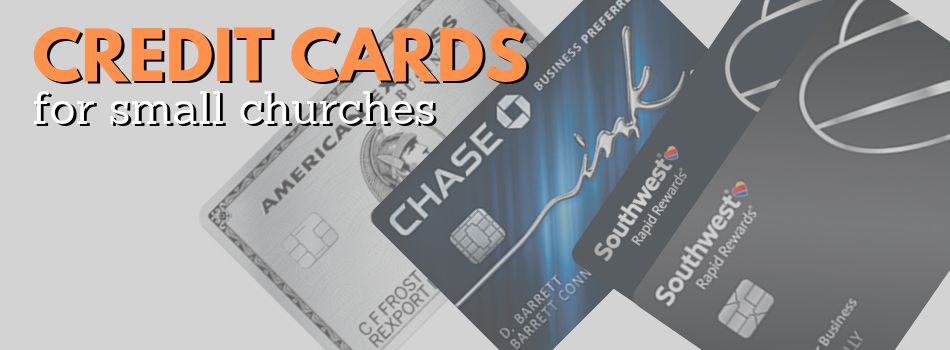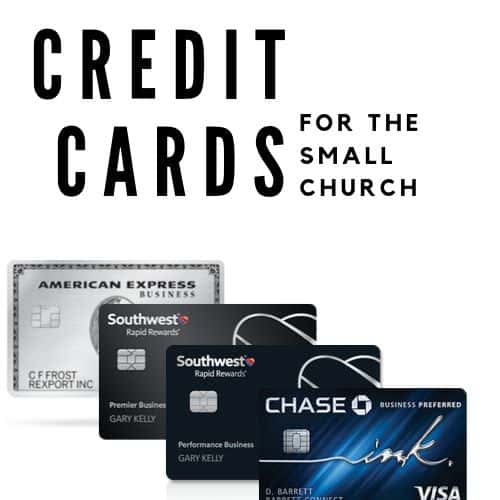
During a post-church lunch chat with a friend, we were discussing using my credit card vs his debit card, and the question of should a church use a credit card came up. The simple answer is YES! A church should use a credit card and in my opinion, every financially responsible adult and entity should as well.
What are the benefits of using a church credit card
There are many benefits to using credit cards, but with most things in life… You get what you pay for. With this in mind, many of the free or no annual fee cards offer some nice limited benefits for literally nothing.
While some of the premium cards can cost more than $500 a year to just have access to the card. Before applying for any of these cards consider what your Expected Overall Value (EOV) is for the card in question. EOV is just a net result of (profits or benefits – costs).
Some of these benefits include things like:
- Ability to accumulate points and miles (obviously)
- Travel insurance
- Rental car insurance
- No foreign transaction fees
- Free airport lounges
- Fraud protection
- Trip delay or cancelation coverage
- Travel credits
- Purchase protection and free extended warranty
- Easy expense tracking and analysis
When taken in as a whole, these benefits can turn a travesty of a mission trip into an encouraging experience.
Think about the last multi-nation missions trip your church sent someone on. How much nicer would a layover in Eastern Europe or Africa have been with a hot shower, electronic charging stations, and free food?
What are the alternatives to using a credit card
Many churches follow the NO DEBT model of church finance. I fully support this and encourage everyone to avoid credit card debt like the plague.
This hard-line approach leaves you with limited options:
- Cash
- Debit cards
- Personal or business checks
- Travelers checks
- Money orders/cashier checks
The problem with these options is ultimately the same issue, putting the church AT RISK in two main ways, theft and fraud.
Credit card theft while abroad
Theft is a huge concern when dealing with cash, travelers checks, money orders, or cashier’s checks. Often bags will be turned over to customs or left in hotel rooms meaning that cash or these other payment options, should be kept on your person 24/7. In some ministry locations, this makes you a much larger target. If a credit card is stolen you can simply cancel it and reissue a new card. In most cases have it overnighted to your hotel anywhere in the world.
The logistical issue depending on the currency structure in the region. In some places, it will take literally pounds of the local currency to pay for a same-day plane ticket out of the country.
This is why I always have at least 2 different credit cards on my person when traveling. If my bag or wallet is stolen, my sock or shoe will still have my VISA and my Visa inside. 🙂
Credit fraud in the home church
Fraud is a concern with debit cards and checks for one huge reason… You are using the church’s actual money… DIRECTLY. When using debit cards the money is removed from your church bank account with no immediate recourse for fraud. While there are obvious protections to repay lost money due to fraud, one big issue is often overlooked, keeping the lights on!
This is might not seem like a big deal for a Mega-Church, but with a church plant, sometimes a few hundred dollars can make or break the budget. If fraud does occur, the church still has cash on hand (and hopefully another line of credit) to handle the daily expenses, while sorting out the problem.
It is much easier to convince a bank that you don’t have to pay, as compared to receiving a reimbursement check. Sometimes a matter of months can go by with that account, or those assets being frozen. Keep their money frozen, while you keep the church’s lights on.
Global acceptance of credit cards
With credit cards you don’t have to get a new card for each country, the processing company will automatically convert your USD into Yen, Euros, or whatever you need, as soon as you swipe.
The acceptance of these other “tangible” or “real” payment methods and exchange options are variable in many locations. The old adage “cash is king”, still rings true worldwide for a reason, although the hay-day of paper money seems to be on the horizon (solo post on this :))
While many underdeveloped nations are struggling with the technology infrastructure to process cards at a noodle cart, or fishing boat… It isn’t that far off, consider the last time you were in a third world country, EVERYONE had a cellphone. That is all that is needed to accept card payments today.
Negatives to using church credit cards
The major detractors to using credit cards for any entity or person can be summed up easily in 2 words: Too Expensive.
Firstly, many studies have shown that the use of credit cards will lead the average consumer to overbuy. This is due to the loss of a connection to the digital ones and zeros that make up our accounts. While most of the studies are skewed by comparing credit cards vs. cash. Even in a more fair comparison of credit vs. debit card, the credit card usually spent more. So if you or your staff have the proclivity for purchasing, consider cash as the standard.
The second hiccup in most plans, paying for benefits and not using them. If you are planning a multinational trip, with copious planned layovers, a travel card with lounge access will be worth its weight in gold. However, if your church never leaves your county limits, then maybe the extra travel benefits might not warrant the annual fees.
How to protect the church from credit fraud
One of the best ways to protect your church from credit fraud is common sense. The old adage “trust, but verify”, is appropriate in this case. Anyone with the ability to sign for the church or spend money in its name should be church leadership or staff.
Where this common-sense rule can sometimes be called into question is for large scale projects.
One example is the use of the church business card to pay for materials at the local hardware store during a church renovation. If a member of the finance team is available to go and pay for the needed supplies, then no-harm no-foul. However this is not always the case, so the church is left with few options:
- Petty cash (terrible idea)
- Reimbursement (this makes those serving now also have to float a loan to the church)
- Credit card designated for church member usage
Of these three options, #3 has the least impact of the project, while also accounting for every cent paid. Not only will the time, goods, and totals be available for an audit, these numbers will be available for the life of the account (generally) to refer back to if needed. This referral can be used for future cost expectations and planning.
A huge benefit is the ability to turn cards on or off at any time. This decreases the opportunity of a card being used without authorization. The “construction card” can be activated and deactivated, around a pre-planned store run, from any computer or phone.
How to rack up FREE travel for your church
Allowing all expenses to travel through a business credit card can allow the church to rack up major points.
- Again, NEVER PAY INTEREST with a credit card.
- If a charge can be processed through a credit card and be immediately paid off with cash, you never have to pay interest.
- If you can set up all the reoccurring utilities, subscriptions, general spending to be funneled through credit card, you can easily bank thousands of points or miles a month for nothing.
- All the travel expenses throughout the year for the Pastor or staff can be easily covered with points or miles.
- Essentially they will be traveling for free with these points, compared to using cash for everything.
- Those points or miles can be used for missions trips, hotel stays for visiting missionaries, or even as part of a benevolence fund to assist the congregation.
What credit cards should a church sign-up for and why?
American Express Business Platinum – Global Travel
- Annual Fee: $595
- Sign-up Bonus: 100,000 points if you spend $25k in 3 months
- Travel Benefits
- Lounge Acess:
- Priority Pass Lounges
- Centurion Lounges
- $200 Airline credit
- 5x points on travel
- No foreign transaction fees
- TSA precheck and Global Entry
- Hilton and Marriott status
- Lounge Acess:
- Purchase Benefits
- Purchase protection from theft or damage for 120 days, up to $10,000 per occurrence and $50,000 per year.
- 1.5 points on any purchase over $5,000
- Insurance
- Baggage insurance of $3,000/ person & $10,000/ Trip
- Secondary car insurance on rentals
- Travel Benefits
Chase Ink Business Preferred – General Spending
- Annual Fee: $95
- Sign-up Bonus: 80,000 points if you spend $5k in 3 months
- Travel Benefits
- 25% bonus on travel redemptions
- 3x points on travel
- No foreign transaction fees
- Trip Cancellation/Trip Interruption Insurance
- If your trip is canceled or cut short by sickness, severe weather and other covered situations, you can be reimbursed up to $5,000 per trip for your pre-paid, non-refundable travel expenses, including passenger fares, tours, and hotels.**
- Purchase Benefits
- Purchase protection from theft or damage for 120 days, up to $10,000 per occurrence and $50,000 per year.
- 3x points on any purchase in business categories:
- Travel
- Shipping purchases
- Internet, cable and phone services
- Advertising purchases made with social media sites and search engines
- Cell Phone Protection
- Get up to $600 per claim in cell phone protection against covered theft or damage for you and your employees listed on your monthly cell phone bill when you pay it with your Chase Ink Business Preferred credit card. Maximum of 3 claims in a 12 month period with a $100 deductible per claim.
- Insurance
- Baggage insurance of $3,000/ person & $10,000/ Trip
- Primary car insurance on rentals
- Extends the time period of the U.S. manufacturer’s warranty by an additional year
- Travel Benefits
Southwest Bundle w/ companion pass – Value Domestic Travel
If you are looking at doing lots of short-haul flights with companions. The Southwest companion pass is the way to go. Essentially, your travel companion is considered a “carry-on-bag”. You book and pay for your ticket and then your companion can hitch a ride along with you for free.
This could easily cut the cost of a traveling ministry team almost in half.
The way to achieve this companion pass is by hitting a benchmark of (at the time of writing this) 110,000 points. You can earn theses through spend, which is the way it is intended to be achieved.
OR
You can sign up for two Southwest credit cards and receive the sign-up bonuses.
The Southwest Rapid Rewards Performance & Premier Business Credit Cards.
With a combined annual fee of $299, you will receive 60,000 points from the Premier and 70,000 points from the Performance. This is all you need to hit the (current) threshold of 110,000 points to receive the companion pass.
- Annual Fee: $299
- Signup Bonus: 110,000 points
- Travel Benefits
- 3x points on Southwest purchases
- No foreign transaction fees
- Baggage Delay Insurance for essential purchases like toiletries and clothing for baggage delays over 6 hours by passenger carrier up to $100 a day for 3 days
- TSA precheck and Global Entry
- Purchase Benefits
- Purchase protection from theft or damage for 120 days, up to $10,000 per occurrence and $50,000 per year.
- 2x points on any purchase in business categories:
- Social Media
- Internet, cable and phone services
- Advertising purchases made with social media sites and search engines
- Insurance
- Baggage insurance of $3,000/ person
- Extends the time period of the U.S. manufacturer’s warranty by an additional year
- Travel Benefits
Card comparison table
American Express Business Platinum | Chase Ink Business Preferred | Southwest Rapid Rewards Performance & Premier | |
| Annual Fee | $595 | $95 | $299 (combined) |
| Travel | – Lounge Acess – $200 Airline credit – 5x points on travel – No foreign transaction fees – TSA precheck and Global Entry – Hilton and Marriott status | – 25% bonus on travel redemptions – 3x points on travel – No foreign transaction fees – Trip Cancellation/ Interruption insurance up to $5,000 per trip | – 3x points on Southwest purchases – No foreign transaction fees – Baggage Delay Insurance delays over 6 hours, up to $100 a day for 3 days – TSA precheck and Global Entry |
| Purchase | – Purchase protection for 120 days, up to $10,000 per occurrence and $50,000 per year. – 1.5 points on any purchase over $5,000 | – Purchase protection for 120 days, up to $10,000 per occurrence and $50,000 per year. – 3x points on any purchase in business categories – Cell Phone Protection up to $600 per claim | – Purchase protection for 120 days, up to $10,000 per occurrence and $50,000 per year. – 2x points on any purchase in business categories |
| Insurance | – Baggage insurance of $3,000/ person & $10,000/ Trip – Secondary car insurance on rentals – Extends the time period of the U.S. manufacturer’s warranty by an additional year | – Baggage insurance of $3,000/ person & $10,000/ Trip – Primary car insurance on rentals – Extends the time period of the U.S. manufacturer’s warranty by an additional year | – Baggage insurance of $3,000/ person – Extended warranty by an additional year |
How to exchange the points or miles for maximum benefit
The general rule of thumb is that most points are valued at a penny. So if used for cashout or cashback, 100,000 points is $1,000 cash. This is a TERRIBLE use of points!!!
Points can be worth 2, 4 or even up to 10 cents per point if transferred to travel partners.
Example: 100,000 American Express points could be transferred to a partner airline, then used to book a ticket that would otherwise have cost $2,000, the points are now giving 2 cents per point. Have on many occasions, and through flash deals gotten 10-12 cents per point in valuation.
This takes very little time to do. I like to think of playing the points game like an arcade. Having already decided that you want to play the game and it costs 2 quarters or tokens to play. Next to the game is a token machine that will play out 6 tokens per dollar. You already wanted to play, but now you get three plays for the price of two. The other side of this … coin; is that if you don’t use the tokens they can not be used elsewhere. This is why I always stockpile Amex & Chase points and only transfer them once I have made my travel plans.
In conclusion
Every church is in a different place financially. NEVER go into unnecessary debt. However, if you look at credit cards as a consistent coupon, that you can use on every single purchase to get 1-30% back, it hopefully takes some of the stings out of the stigma.
If you are finding this whole idea of the credit card points game to be a bit overwhelming. Consider the fact that this can be something delegated to a member of the staff or even a youth group member. Kids have been known to be tech-savvy. This is also a great way to get youth groups to start learning personal finance, but I’ll save that for a future post.





